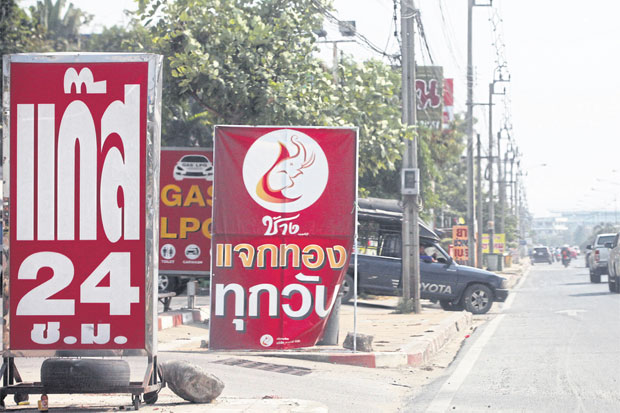
After a few good years, liquefied petroleum gas (LPG) retailers are now suffering a sharp fall in demand, forcing operators to diversify business and seek ways to survive.
The slowdown in demand could also force small players to merge with larger ones next year, industry officials said.
LPG retailers in the transport segment have felt the pinch from the sharp fall in global oil prices, which are unlikely to revisit the record highs of over US$100 a barrel, making the price of LPG uncompetitive and encouraging motorists to switch to oil.
The gradual removal of the universal government subsidy on LPG prices, which began in 2015 and fully completed in the second half of this year, was a further blow to the LPG market.
The boom in LPG retail started when global oil prices surged above $100 a barrel, while the price of LPG, known as "cooking gas", was capped at fixed price by the government in an effort to curb the rise in costs of living. LPG prices continued to be fixed for about a decade.
Global prices slumped in 2014, plunging from a record high of $147 a barrel early in the year to $45-$50 a barrel and was forecast to stay below $60 a barrel for years, encouraging many of motorists to switch back to oil.
The number of new LPG retailing stations registered with the Department of Energy Business (DOEB) has been dropping sharply since early this year.
As of October this year, the number of LPG stations stood at 1,870 stations, down from 2,400 stations during the LPG boom in 2013.
The volume of LPG sales through retail stations dropped by 11%, indicating that more small LPG stations are out of business, while others are expected to switch to petrol.
DOEB director-general Witoon Kulcharoenwira said global oil prices may rise slightly, but are unlikely to breach $100 a barrel in the next few years.
This is likely to lead to a lot of changes in LPG business, particularly in the retailing sector.
He said there could be more mergers and acquisitions (M&A) of small and medium-sized LPG stations with larger ones next year.
Esso Thailand Plc, the country's fourth largest oil retailer, is planning to join local LPG retail station operator Best Energy Co and turn the LPG stations into petrol stations as a part of its business expansion plan to have 40 stations within next year.
Esso expects Best Energy stations to help Esso's total sales substantially to rank it the third largest by next year, said Esso's retail sales manager Yodpong Sutatham.
Takuni Group Plc, another leading LPG retailer, has suspended its LPG retail business for the transport segment, keeping only its LPG wholesale in operation.
Nita Treeweeranuwat, Takuni director-general, said demand for LPG has fallen for the third consecutive year this year, especially after the government started to unwind the heavy LPG subsidies.
She said Takuni will focus on engineering construction through its subsidiary CAZ Thailand Co, for which business prospects are brighter than LPG retail.
Ms Nita said CAZ Thailand has a backlog under construction worth a total of 377 million baht, while there are new construction projects that the company has committed to worth 999 million baht. The new projects are expected to start generating revenue within the next few years.
"Because of this, the company expects to increase the proportion of revenue generated from construction business to 50%," said Ms Nita, up from the current 30%.
She said this was part of the plan to adjust itself to match the changing scenario, as demand for LPG drops sharply while demand for construction services rise.
A source familiar with LPG retailing said falling demand for LPG in the transport sector has forced small LPG retailers that do not have strong branding, such as Palang Aswin Co, out of business.
However, while the overall LPG business in Thailand is subdued, some major LPG operators are bucking the trend by expanding constantly, said the source.
In the third quarter of this year, the number of gas stations under major LPG operators rose substantially. WP Energy Plc, which operates World Gas became the biggest LPG retailer, with 514 gas stations.
Siam Gas is second with 450 stations, while Unique Gas ranks third with 127 stations.
This is a sharp contrast to small gas players, which are dying.
SET-listed WP Energy has diversified into new businesses in a bid to avert risks after the gas trading system was deregulated and domestic retail prices were floated.
Chief executive Chomkamol Poompanmoung said the company has set up five wholly-owned subsidiaries to operate LPG land transport, gas retail stations, car rental, solar farm and LPG cylinder maintenance and repair service.
"The plan is to pave the way for the company to offer a comprehensive gas operation, which would help generate dependable revenue to support the company in the long run," said Ms Chomkamol.
She said the company's total LPG sales volume has reached 635,629 tonnes so far this year, accounting for around 21% of total gas sales in the Thai market and ranking it the second largest gas retailer after PTT Plc, the national oil and gas conglomerate.
WP Energy had total sales of 930,000 tonnes in 2016, worth 16.3 billion baht in revenue, and saw 54 million baht in net profit.
Ms Chomkamol said the company will continue to expand its gas transport business by expanding into Cambodia, Laos, Myanmar and Vietnam, where demand for LPG should rise in line with growing economies.
